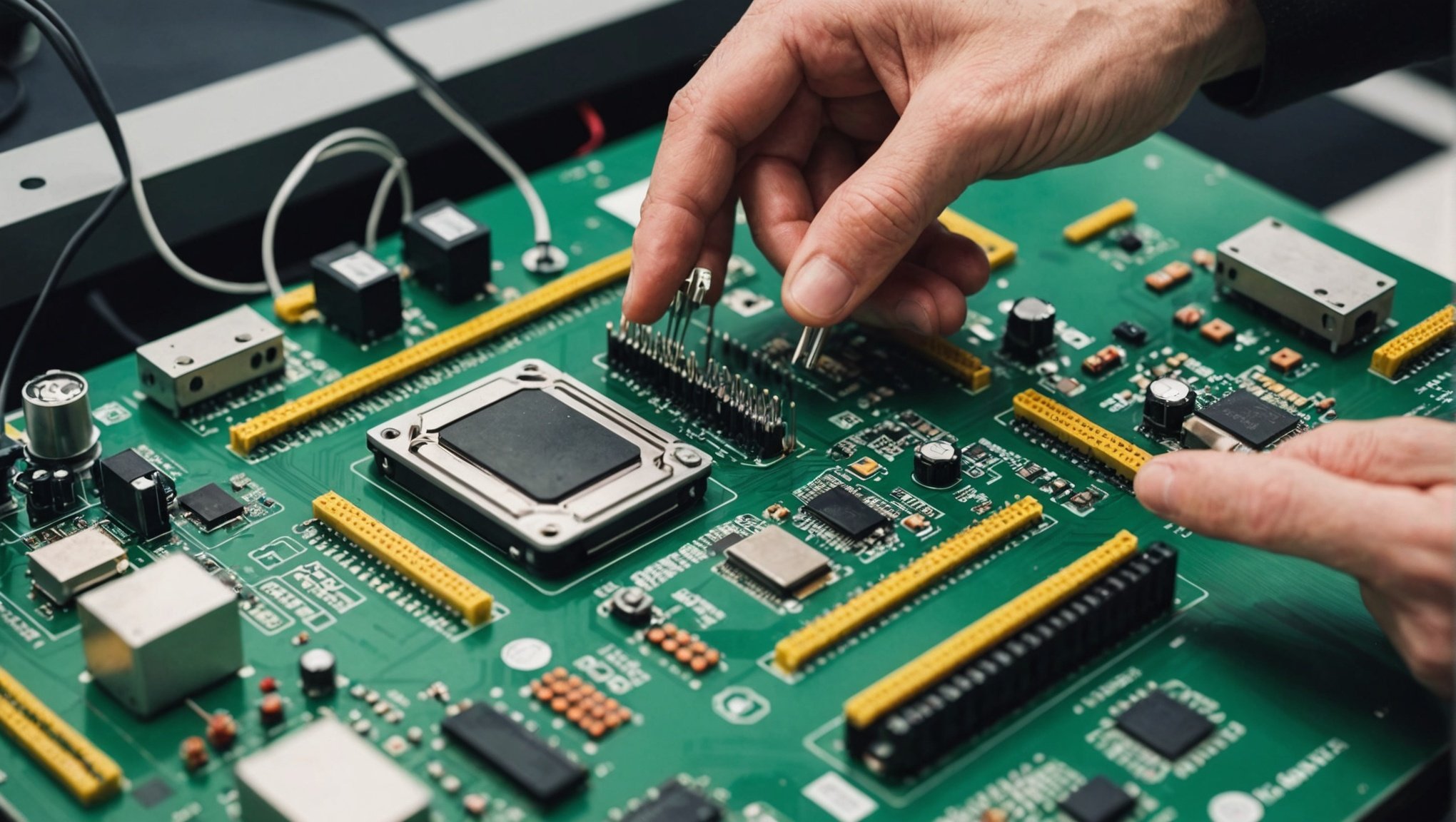The environmental impact of hardware manufacturing in the UK raises pressing concerns for tech firms. Eco-friendly innovations present a pathway to address these challenges effectively. By adopting sustainable practices and incorporating advanced technologies, companies can not only reduce their carbon footprint but also enhance their market competitiveness. This exploration highlights actionable strategies that UK tech firms can implement to transform their manufacturing processes, fostering a greener future while satisfying consumer demand for sustainability. Discover how these innovations can reshape the industry landscape.
Overview of Eco-Friendly Innovations in Hardware Manufacturing
In today's tech-driven world, eco-friendly innovations are reshaping the landscape of hardware manufacturing. These innovations are crucial in addressing the environmental impact of technology production. By integrating sustainable practices, the industry aims to reduce waste, conserve resources, and lower carbon footprints.
Also read : What Are the Legal Challenges Faced by UK Companies Adopting Blockchain Technology?
Definition and Importance
Eco-friendly innovations refer to the adoption of processes and materials that minimize harm to the environment. In hardware manufacturing, this means utilizing renewable resources, reducing energy consumption, and enhancing product longevity. The importance of such innovations lies in their potential to significantly mitigate climate change, preserve natural ecosystems, and promote a healthier planet for future generations.
Current Trends
Several trends are emerging in sustainable hardware manufacturing. Companies are increasingly adopting circular economy models, where products are designed for reuse and recycling. There's also a shift towards using biodegradable materials and energy-efficient production techniques. These strategies not only support environmental goals but also offer economic benefits by reducing costs and meeting consumer demand for greener products.
Also read : Revolutionizing Urban Mobility: The Role of AI in Optimizing Traffic Flow in Smart Cities Across the UK
Role of UK Tech Firms
UK tech firms are at the forefront of promoting sustainability in tech. Many are investing in research and development to pioneer eco-friendly solutions. By setting ambitious sustainability targets and collaborating with environmental organizations, these firms are leading the charge in creating a more sustainable tech industry. Their efforts are crucial in setting standards and inspiring global change in hardware manufacturing practices.
Strategies for Reducing Environmental Impact
In the realm of hardware manufacturing, the adoption of strategies for sustainability is pivotal in reducing the industry's carbon footprint. These strategies encompass a variety of approaches aimed at minimizing environmental impact throughout a product's lifecycle.
Lifecycle Assessment
A crucial aspect of eco-friendly manufacturing is conducting a lifecycle assessment. This method evaluates the environmental effects associated with all stages of a product's life, from raw material extraction to disposal. By understanding these impacts, manufacturers can identify areas for improvement and implement more sustainable practices. For instance, choosing materials that are easier to recycle or that have a lower carbon footprint can significantly contribute to sustainability goals.
Renewable Energy Sources
The use of renewable energy sources in production processes is another effective strategy. By integrating solar, wind, or hydropower, companies can drastically reduce their reliance on fossil fuels, thereby lowering their carbon emissions. This shift not only supports environmental objectives but also often results in cost savings over time.
Circular Economy Principles
Implementing circular economy principles in hardware design is also gaining traction. This involves designing products that can be easily disassembled, repaired, and recycled. Such practices ensure that materials remain in use for as long as possible, reducing waste and conserving resources. By embracing these strategies, manufacturers can significantly mitigate their environmental impact while also benefiting economically.
Case Studies of Successful UK Tech Firms
Understanding how UK tech firms are leading the charge in sustainability requires a closer look at their successful sustainability initiatives. These case studies reveal innovative approaches and the impact of eco-friendly practices in hardware manufacturing.
Analysis of Leading UK Tech Firm
One standout example is a prominent UK tech firm that has integrated eco-friendly manufacturing processes. This firm has adopted a circular economy model, ensuring products are designed for longevity and recyclability. By prioritizing renewable materials and energy-efficient production, they've significantly reduced their carbon footprint.
Comparative Study of Multiple Firms
Comparing various UK tech firms, each employs unique sustainability strategies. While some focus on renewable energy integration, others emphasize lifecycle assessments to minimize environmental impact. This diversity in approach highlights the adaptability and commitment of the UK tech sector to sustainable innovation.
Lessons Learned
From these successful implementations, several lessons emerge. Firstly, collaboration with environmental organizations enhances credibility and support for sustainability goals. Secondly, setting ambitious targets and regularly assessing progress ensures accountability. Lastly, investing in research and development fosters continuous improvement and innovation in eco-friendly practices.
These case studies not only illustrate the potential of eco-friendly innovations but also serve as a blueprint for other industries aiming to reduce their environmental impact.
Challenges in Implementing Eco-Friendly Practices
Adopting eco-friendly manufacturing practices comes with its own set of challenges. UK tech firms, despite their commitment to sustainability, encounter several barriers to implementation. Understanding these obstacles is crucial for developing effective strategies to overcome them.
Common Obstacles
One significant challenge is the economic implications of transitioning to sustainable manufacturing. Initial investments in new technologies and processes can be substantial. Many companies face financial constraints, making it difficult to allocate resources towards eco-friendly initiatives. Additionally, the long-term financial benefits of sustainable practices are not always immediately apparent, leading to hesitancy in adoption.
Regulatory Challenges
Regulatory challenges also pose a significant hurdle. Compliance with UK regulations requires navigating complex legal frameworks. Firms must ensure their practices align with environmental laws, which can be time-consuming and costly. Additionally, staying updated with evolving regulations demands continuous monitoring and adaptation, further complicating the process.
Compliance Issues
Compliance issues, particularly in the context of sustainability, can deter firms from fully embracing eco-friendly manufacturing. The lack of standardized guidelines often results in confusion and inconsistency in implementation. To address these challenges, it's essential for companies to invest in research and development, fostering innovation and collaboration with regulatory bodies to streamline compliance processes.
Best Practices for Sustainable Hardware Manufacturing
Implementing best practices in sustainable hardware manufacturing is essential for reducing waste and improving efficiency. Companies should focus on eco-friendly guidelines that integrate seamlessly into their production processes. By adopting sustainable manufacturing tips, firms can achieve significant environmental and economic benefits.
Key Best Practices
- Waste Reduction: Implementing a waste management strategy that prioritizes recycling and reuse can drastically cut down on production waste.
- Energy Efficiency: Upgrading to energy-efficient machinery and optimizing production schedules can lead to substantial energy savings.
- Sustainable Sourcing: Choosing suppliers who adhere to sustainable practices ensures that the entire production chain is eco-friendly.
Importance of Employee Training and Stakeholder Engagement
Employee training is critical in fostering a culture of sustainability. Educating staff on eco-friendly guidelines ensures that everyone is aligned with the company's sustainability goals. Engaging stakeholders, including suppliers and customers, enhances transparency and accountability, promoting a collective effort towards sustainable manufacturing.
Monitoring and Reporting
Effective monitoring and reporting on sustainability initiatives are crucial. By regularly assessing progress and making data-driven decisions, companies can refine their strategies and demonstrate their commitment to sustainability. Transparent reporting also builds trust with stakeholders, showcasing the company's dedication to eco-friendly practices.
Future Trends in Eco-Friendly Hardware Manufacturing
As the tech industry evolves, future trends in eco-friendly hardware manufacturing are poised to reshape how devices are produced. Emerging technologies are playing a crucial role in driving sustainability in tech.
Emerging Technologies
Innovations such as biodegradable materials and advanced recycling methods are gaining traction. These technologies not only reduce waste but also enhance the lifecycle of hardware products. For instance, the development of bioplastics offers a sustainable alternative to traditional plastics, reducing environmental impact significantly.
Predictions for the Future
Looking ahead, the integration of artificial intelligence in manufacturing processes is expected to optimise resource use, further promoting eco-friendly practices. AI can predict maintenance needs, reducing downtime and waste. Additionally, 3D printing is anticipated to revolutionise production by minimising material waste and allowing for more sustainable designs.
Consumer Demand
Consumer demand is increasingly influencing sustainable manufacturing practices. As awareness of environmental issues grows, consumers are prioritising eco-friendly products. This shift is pressuring manufacturers to adopt sustainable innovations to meet market expectations. The demand for transparency in production processes is also driving companies to implement more sustainable practices, ensuring their operations align with consumer values.











